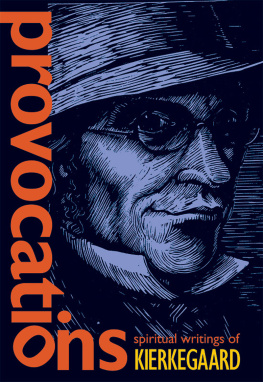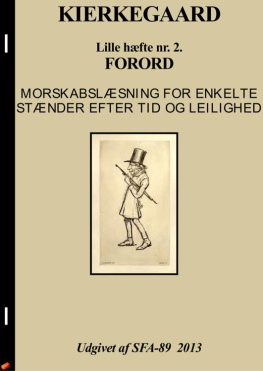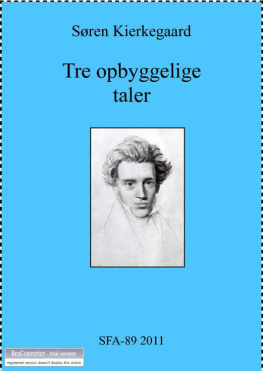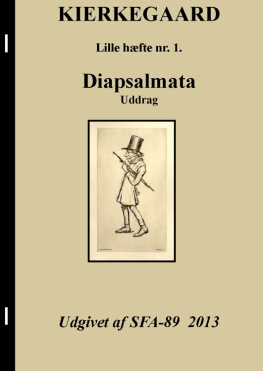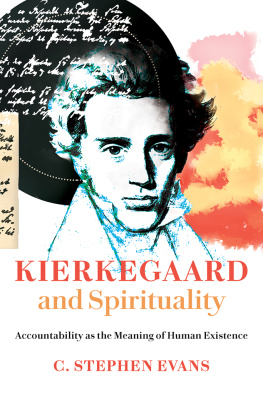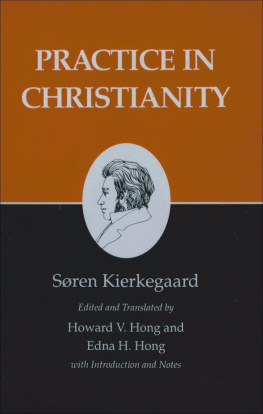Provocations
Spiritual Writings of Kierkegaard
Compiled and Edited by Charles E. Moore

Plough Publishing House
Published by Plough Publishing House
Walden, New York
Robertsbridge, England
Elsmore, Australia
www.plough.com
Copyright 2002, 2014 by Plough Publishing House
All Rights Reserved.
Print ISBN: 978-0-87486-643-8
Pdf ISBN: 978-0-87486-626-1
Epub ISBN: 978-0-87486-624-7
Mobi ISBN: 978-0-87486-625-4
Woodcut on cover and frontispiece: Karl Mahr, 1925
Introduction
Sren Kierkegaard has been accused of being one of the most frustrating authors to read. He has also been praised as one of the most rewarding. Frustrating, because his style is so dense, his thought so complex, and his words so harsh. Rewarding, because embedded within his writings and journals are metaphors and truths so deep and vivid that they can overwhelm you with an almost blinding clarity. Kierkegaard is not one to be read lightly, lest you get burned.
The purpose of this collection is twofold. The first is to make Kierkegaard accessible. Even for the brightest, Kierkegaard is tough going. Walter Lowrie, Kierkegaards most devoted biographer, writes: Kierkegaard exacts of his reader a very great effort. He declines to make things easy for him by presenting a conclusion, and he obliges him, therefore, to approach the goal by the same difficult path he himself has trod.
Even Kierkegaards fellow Danes found him difficult. This is unfortunate. Contained within his writings are some of the richest, most illuminating passages on faith and commitment ever penned. To help unearth some of these treasures, I have taken the liberty to abridge lengthy pieces, paraphrase complex passages, and tighten and simplify convoluted constructions.
Secondly, this collection is meant to present in as concise a way as possible the heart of Kierkegaard. By heart I mean first those pieces that are concerned with the core themes of his prolific output, second, those that exemplify the essence of his thought, and last but not least, his passion.
Kierkegaards Central Passion
Kierkegaard wrote industriously and rapidly, and under a variety of pen-names, presenting various esthetic, ethical, and religious viewpoints on life. His writings display such a wide range of genre and style, and his thought covers such a variety of subjects that even he himself felt compelled to write a book to explain his agenda. Despite this, Kierkegaard was single mindedly driven. He writes in his Journal: The category for my undertaking is: to make people aware of what is essentially Christian. Two things are noteworthy. First, Kierkegaard aims to make us aware. I have worked for a restlessness oriented toward inward deepening. My whole life is an epigram calculated to make people aware. In short, Kierkegaards task was not the introduction of new ideas, a theology or philosophy of life. Rather, he said My task is in the service of truth; and its essential form is obedience. Kierkegaard was fundamentally existential: to keep people awake, in order that religion may not again become an indolent habit His aim was to provoke the individual so as to become an individual in the truth. The last thing Kierkegaard wanted to do was to leave his reader the same intellectually enlightened yet inwardly unchanged.
Early in his life, Kierkegaard made the discovery that one must find a truth which is true for me the idea for which I can live and die. Part of the human predicament was that we are all interested in far too many things and thus are not decidedly committed to any one thing. As he writes in his Journal:
What I really lack is to be clear in my mind what I am to do, not what I am to know, except in so far as a certain understanding must precede every action. The thing is to understand myself, to see what God really wishes me to doWhat good would it do me if the truth stood before me, cold and naked, not caring whether I recognized her or not, and producing in me a shudder of fear rather than a trusting devotion? Must not the truth be taken up into my life? That is what I now recognize as the most important thing.
Kierkegaards central task as an author, therefore, was to help the reader make the truth his own. He deliberately and carefully plotted his entire authorship to show his readers what it means to exist, and what inwardness and subjectivity signify. His strategy was to help them take a decisive stand: I wish to make people aware so that they do not squander and dissipate their lives.
Secondly, Kierkegaard is concerned with what is essentially Christian: Through my writings I hope to achieve the following: to leave behind me so accurate a characterization of Christianity and its relationships in the world that an enthusiastic, noble-minded young person will be able to find in it a map of relationships as accurate as any topographical map from the most famous institutes.
Of what does this map consist? In Practice of Christianity, Kierkegaard writes: If anything is to be done, one must try to introduce Christianity into Christendom. The backdrop to his entire authorship was a Danish Lutheranism that had degenerated into a nominal state-religion. Three things, in particular, marred the church of his day: (1) Intellectualism the direct mental assent to a sum of doctrines; (2) Formalism battalions upon battalions of unbelieving believers; and (3) Pharisaism a herd of hypocritical clergy that ignore the Christianity they were hired to preach. It was in this climate that Kierkegaard felt compelled to reintroduce Christianity. He sought to provide a kind of map that would, for the sake of Christian truth, steer people away from Christendom. An apostles task is to spread Christianity, to win people to Christianity. My task is to disabuse people of the illusion that they are Christians yet I am serving Christianity.
By Christianity Kierkegaard did not mean a system of correct doctrine or a set of behaviors: The struggle is not between orthodoxy and heterodoxy. My struggle, much more inward, is about the how of the doctrine. I say that someone can accept the whole doctrine, but in presenting it he destroys it. Kierkegaards contention was that despite sound doctrine, or the what of faith, the lives people live demonstrate that there is really no Christianity or very little. Genuine Christianity, according to Kierkegaard, is anything but doctrine. It is a way of being in the truth before God by following Jesus in self-denial, sacrifice, suffering, and by seeking a primitive relationship with God. Unfortunately, doctrine is what people want. And the reason for this is because doctrine is the indolence of aping and mimicking for the learner, and doctrine is the way to power for the teacher, and doctrine collects people.
Kierkegaards thinking originated in a violent revulsion for the spurious spirituality of his day. His difficulty was to find a way out of the confusion that consistently undermined anything truly Christian. How in the world are we to get out of the mess of Christendom, he wondered, when millions, due to the accident of geography, are Christians? How are we to get Christendom to drop its whole mass of nominal members when it is the interest of the clergymans trade that there be as many Christians as possible? How, exactly, are we to become Christian, especially when one is a Christian of a sort?
Kierkegaards strategy was to act as a corrective. He explains: The person who is to provide the corrective must study the weak sides of the established order scrupulously and penetratingly and then one-sidedly present the opposite with expert one-sidedness. This revelation is important to keep in mind while reading Kierkegaard. All the same he said, a corrective made into the norm is by that very fact confusing. Therefore, one should not lift his thought up and turn it into a norm. He felt his situation to be desperate, so he sounded the alarm accordingly. Yet he did not do this as some self-proclaimed prophet. He wrote as one who was without authority and who himself needed reforming: What I have said to myself about myself is true I am a kind of secret agent in the highest service. The police use secret agents, tooBut the police do not think of reforming their secret agents. God does.

